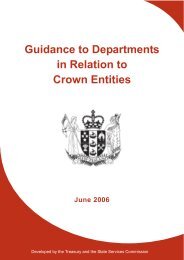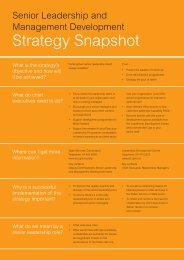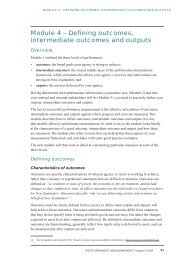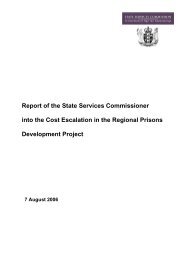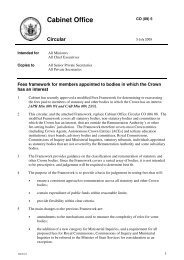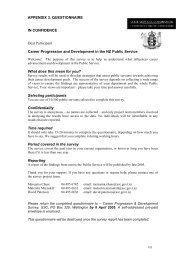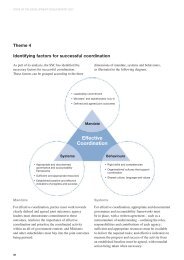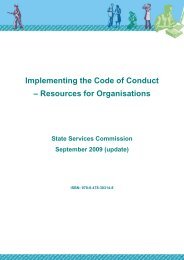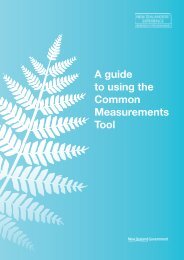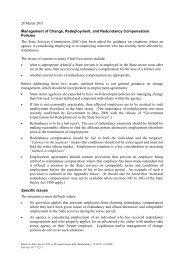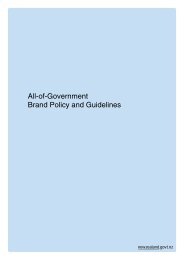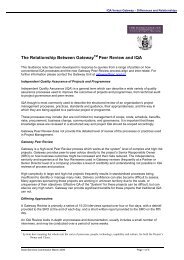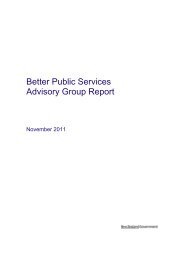Blank Doc with SSC Logo and RDMS Doc Number - State Services ...
Blank Doc with SSC Logo and RDMS Doc Number - State Services ...
Blank Doc with SSC Logo and RDMS Doc Number - State Services ...
Create successful ePaper yourself
Turn your PDF publications into a flip-book with our unique Google optimized e-Paper software.
inseparable from them. The st<strong>and</strong>ards are embedded in the examination. This holds true<br />
even for the new 2004 Scholarship which aimed to set an explicit, st<strong>and</strong>-alone st<strong>and</strong>ard<br />
for each subject.<br />
51 Setting st<strong>and</strong>ards for school students, based on national curriculum statements, which are<br />
deliberately developmental in nature, presents a different challenge from setting<br />
st<strong>and</strong>ards in industry, the professions <strong>and</strong> most tertiary courses. School students are<br />
developing <strong>and</strong> growing, <strong>and</strong> the st<strong>and</strong>ards must acknowledge a wide base of<br />
participating talent <strong>and</strong> developing achievement. They require the interpretation of<br />
experienced teachers.<br />
52 The Ministry <strong>and</strong> NZQA recognised this complexity, <strong>and</strong> did not ignore links between<br />
curriculum <strong>and</strong> assessment. The st<strong>and</strong>ards for the 2004 Scholarship subjects, the<br />
subsequent examinations papers, marking schedules <strong>and</strong> the marking were in the h<strong>and</strong>s<br />
of a reasonably tight core of people in the secondary <strong>and</strong> tertiary education community.<br />
These dedicated people, on whom the assessment system relies, were frequently past<br />
examiners <strong>and</strong> markers of the University Bursary examinations or the NZEST<br />
examinations. A number of them served on the Ministry’s st<strong>and</strong>ards-setting panels <strong>and</strong><br />
brought their experience <strong>and</strong> knowledge to the task.<br />
53 They did however need firm guidance <strong>and</strong> direction. A degree of inflexibility in the roles<br />
of the two agencies seems to have impeded the coordination <strong>and</strong> resolution of issues<br />
needed to implement a new examination <strong>with</strong> new st<strong>and</strong>ards, <strong>and</strong> a new way of assessing<br />
<strong>and</strong> ranking. This inflexibility manifested itself most obviously at the working level <strong>and</strong><br />
is likely to be rooted in history <strong>and</strong> is difficult to untangle. While differences in view<br />
amongst professionals are to be expected, the lesson to be drawn is that the issues<br />
debated in both organisations need to be referred to senior managers for resolution rather<br />
than languishing at lower levels. The leaders of the respective organisations have not<br />
been fully successful in ensuring that substantive issues are escalated for resolution <strong>and</strong><br />
this requires urgent <strong>and</strong> sustained attention.<br />
54 The National Assessment Facilitators in NZQA should have been fully involved in<br />
setting the 2004 Scholarship st<strong>and</strong>ards instead of being at the margins, if only to reduce<br />
the time it took later to refine the st<strong>and</strong>ards <strong>and</strong> make the examinations operationally<br />
possible. More realistic knowledge of the length <strong>and</strong> dem<strong>and</strong>s of assessment operations<br />
would have informed the content of the st<strong>and</strong>ards, kept them realistic for a one-off<br />
competitive assessment, <strong>and</strong> kept the st<strong>and</strong>ards-setting on target so that support material<br />
could be generated in time to meet the school year. Equally, the Ministry should have<br />
been kept informed <strong>and</strong> involved in the assessment details instead of being kept at a<br />
distance by NZQA.<br />
55 One point where the relationship broke down was professional development. It seems<br />
that at the time of the Scholarship examination st<strong>and</strong>ards being written, the writers<br />
developed early exemplars. The Ministry felt the quality of these exemplars was uneven<br />
but they were a resource <strong>and</strong> were given to NZQA. Further, the Ministry felt that the<br />
Jumbo days offered the chance to stage-manage some of this exploratory <strong>and</strong><br />
developmental material. However, NZQA was reluctant to use the material because it<br />
wished to have accurate assessment exemplars based on firmly agreed subject st<strong>and</strong>ards,<br />
knowing that teachers rely closely on past experiences <strong>and</strong> examples when preparing<br />
students for competitive examinations. NZQA subsequently contracted the development<br />
of new exemplars. The two agencies did not seem able to resolve their differences. The<br />
outcome was that the booklets for the professional development Jumbo days contained<br />
little material to help embed the Scholarship examination st<strong>and</strong>ards.<br />
9



